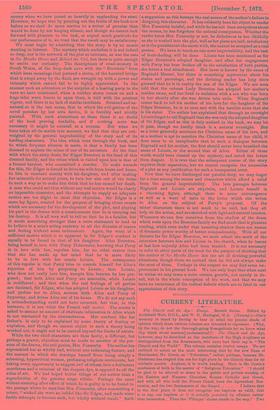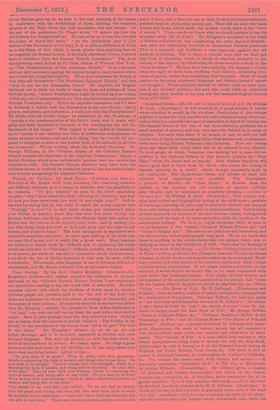CURRENT LITERATURE.
The Church and the Age : Essays. Second Series. Edited by Archibald Weir, D.C.L., and W. D. Maclagan, M.A. (Murray.)—One's memory is taxed by having to bear in mind the precise shade of opinion which these various volumes are intended to represent. (Why, by the way, do not the thorough-going Evangelicals let us know what they think about matters; ecclesiastical?) The Church and the Age, however, may be described as the manifesto of the High Anglicans as distinguished from the Romanisers, who have had their say in "The Church and the World." The volume contains twelve essays. We are inclined to select as the most interesting that by the new Dean of Manchester, Mr. Cowie, on "Toleration," rather, perhaps, because Mr. Gladstone has singled him out for high place in the Church than for its intrinsic merits. Anyhow, it is worth reading. Here is Mr. Cowie's confession of faith in the matter of "Religious Toleration." "I should be glad to be allowed to share in the public and private worship of the Eastern and Western Churches, Roman Catholic and Greek, and with all who hold the Nicene Creed, have the Apostolieal Suc- cession, and the two Sacraments of the Gospel I believe that in the first place it does not recognise our baptism as valid, that is to say, our baptism as it is actually practised, by effusion rather than immersion. Then the 'Filioque ' clause stands in the way." Two e our Bishops gave up, as we take it, the real meaning of the clause in conference with the Archbishop of Syra, limiting the temporal
mission of the Holy Ghost, but that concession was not enough. At the end of the conference Dr. Pusey wrote, "I cannot say how the Archbishop has disappointed me. He has, as far as in him lies, crushed the hopes of thirty-five years." "As the Archbishop puts it [the matter of the Procession of the Son], it is a serious difference of Faith as to the Being of God, which is much graver than anything that we have against the Roman Church. If he really represents Greece, I should have to withdraw from the Eastern Church Association." The most disappointing essay is that by Dr. Ooze, Bishop of Western New York, on "The Characteristics of the American Church." It is a laboured and not very successful apology for various things in their practice which have a look not altogether Catholic. What most distresses the Bishop is that they call themselves "The Protestant Episcopal Church," and that "they do not use the Athanasian Creed." He implores his English brethren not to think too badly of them for these sad fallings-off from Catholic purity. "Scotch Presbyterians might be looked upon as coming within my rule of comprehension, for they may have preserved succession through Presbyters only. This is an imperfect succession, and if I were in Scotland, I should seek the Sacraments in my own Church ; but in prayer, and praise, and instruction, I could join with the Presbyterians." He thinks that the Lord's Supper as celebrated by the Wesleyans is "merely a rite commemorative of the Lord's death, and if made with piety and faith, beneficial to the souls of the worshippers, but not the Sacrament of the GospeL" With regard to other bodies of Dissenters,
he is "unable to tell whether our faith is sufficiently homogeneous to
make common worship a real and true thing," but he "would be pre- pared to recognise a more or less perfect form of Christianity in all who are in earnest." We see nothing about the Lutheran Churches. Dr.
George Williams, in his "Present Aspect of the Orthodox Eastern Church towards the Churches of the Anglican Communion," dispels a foolish delusion which some enthusiastic persona here are comforting themselves with. The Eastern Church, whatever may have been the eivilities shown or received by particular persons, has not made a single step towards recognising the Anglican Churches.



































 Previous page
Previous page